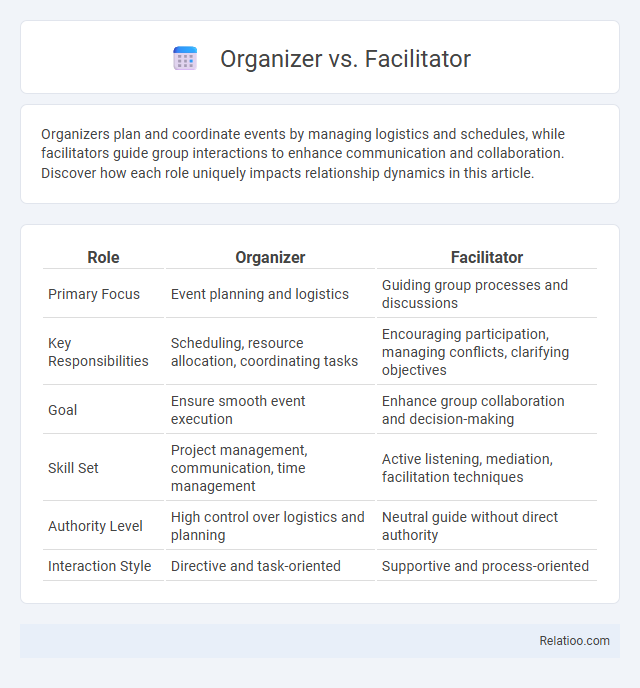Organizers plan and coordinate events by managing logistics and schedules, while facilitators guide group interactions to enhance communication and collaboration. Discover how each role uniquely impacts relationship dynamics in this article.
Table of Comparison
| Role | Organizer | Facilitator |
|---|---|---|
| Primary Focus | Event planning and logistics | Guiding group processes and discussions |
| Key Responsibilities | Scheduling, resource allocation, coordinating tasks | Encouraging participation, managing conflicts, clarifying objectives |
| Goal | Ensure smooth event execution | Enhance group collaboration and decision-making |
| Skill Set | Project management, communication, time management | Active listening, mediation, facilitation techniques |
| Authority Level | High control over logistics and planning | Neutral guide without direct authority |
| Interaction Style | Directive and task-oriented | Supportive and process-oriented |
Understanding the Roles: Organizer vs Facilitator
Understanding the roles of Organizer vs Facilitator is crucial for effective event management and team collaboration. An Organizer primarily handles logistics, scheduling, and coordination to ensure events run smoothly, while a Facilitator focuses on guiding discussions, encouraging participation, and managing group dynamics to achieve productive outcomes. Your success in any project depends on leveraging the distinct strengths of each role to meet both operational needs and interpersonal engagement.
Key Responsibilities of an Organizer
An Organizer primarily focuses on coordinating resources, managing logistics, and ensuring smooth execution of events or projects by developing detailed plans and schedules. Key responsibilities include mobilizing participants, securing venues and materials, and monitoring progress to meet deadlines and objectives. Organizers also handle communication between stakeholders to maintain alignment and troubleshoot operational challenges effectively.
Core Duties of a Facilitator
A facilitator's core duties involve guiding group discussions, encouraging participation, and ensuring that meetings remain focused and productive. Unlike organizers who primarily handle logistics or event planning, facilitators manage the flow of communication and conflict resolution to help your team achieve consensus. Their skill set includes active listening, neutrality, and effective questioning to foster collaboration and decision-making.
Skills Required: Organizer and Facilitator Compared
Organizers require exceptional planning, time management, and multitasking skills to coordinate events and resources efficiently. Facilitators excel in communication, active listening, and conflict resolution to guide group discussions and ensure collaborative decision-making. Your choice between an organizer and a facilitator depends on whether your priority is structured execution or dynamic group interaction.
Differences in Planning and Execution
Organizers primarily focus on detailed planning and coordinating resources to ensure a structured event, while facilitators emphasize guiding group interactions and promoting collaboration during execution. Your role as an organizer involves setting clear objectives and logistics, whereas facilitators manage the dynamic flow of discussions to achieve participant engagement. Understanding these distinctions helps optimize event outcomes by aligning responsibilities with specific skills in planning versus interactive execution.
Communication Styles in Organizing vs Facilitating
Organizers employ direct and assertive communication styles to establish structure, set clear roles, and enforce deadlines, ensuring task-oriented progress. Facilitators use collaborative and open-ended communication, encouraging dialogue, active listening, and consensus-building to foster participation and shared understanding. This contrast highlights how organizing emphasizes control and direction, while facilitating prioritizes inclusivity and group dynamics.
Impact on Team Dynamics
The roles of organizer, facilitator, and coordinator each uniquely impact team dynamics by shaping communication flows and collaboration efficiency. An organizer structures tasks and timelines, fostering clarity and reducing confusion, while a facilitator promotes open dialogue and ensures all voices are heard, enhancing mutual understanding. Selecting the right role for your team can significantly improve productivity and interpersonal relationships, aligning efforts toward shared goals.
When to Choose an Organizer Over a Facilitator
Choose an organizer over a facilitator when the primary goal is detailed planning, task coordination, and ensuring that event logistics are meticulously managed. Organizers excel in handling schedules, budgets, and resource allocation, making them ideal for projects requiring structured execution and adherence to timelines. Facilitators focus more on guiding group discussions and fostering collaboration, which is less crucial during the pre-event organizational phases.
Benefits of Combining Both Roles
Combining the roles of organizer and facilitator enhances project efficiency by merging structured planning with dynamic support for team collaboration. This integration fosters clear communication, streamlined workflows, and adaptive problem-solving, resulting in higher productivity and stakeholder satisfaction. Leveraging both roles ensures tasks are managed effectively while encouraging active participation and innovation within the group.
Real-Life Scenarios: Organizer vs Facilitator in Action
In real-life scenarios, an organizer coordinates logistics, manages schedules, and ensures resources are available for events or projects, while a facilitator guides group discussions, encourages participation, and fosters collaboration for effective decision-making. For example, during a corporate workshop, the organizer handles venue booking and invitations, whereas the facilitator leads interactive sessions to align team objectives. Understanding these distinct roles enhances event success and team productivity in diverse settings.

Infographic: Organizer vs Facilitator
 relatioo.com
relatioo.com